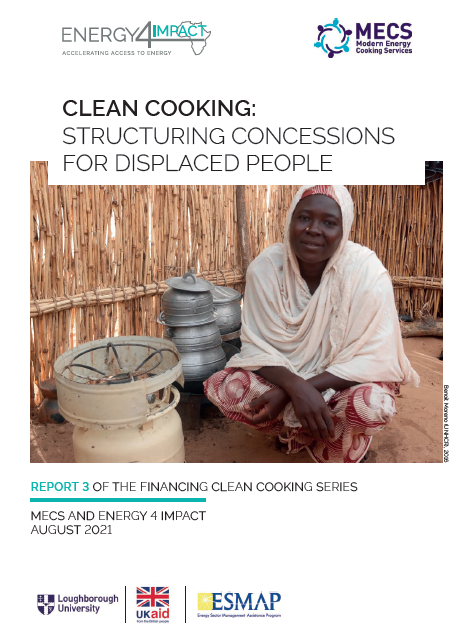- Date
- 7th September 2021
- Categories
- General
The research partnership between Energy 4 Impact and the UK aid-funded Modern Energy Cooking Services (MECS) programme continues with the launch of the third report in our joint Financing Clean Cooking series. The report Clean Cooking: Structuring Concessions for Displaced People looks at the potential for clean cooking concessions in refugee camps and other displacement settings.

Several of the largest refugee camps in the world can be found in sub-Saharan Africa and cooking with charcoal and firewood is the norm within these camps. Not only does this harm the environment, it also causes health problems and premature deaths through indoor air pollution. Humanitarian efforts have therefore focussed on bringing modern energy cooking solutions to the camps by means of subsidies and concessions. A concession is a market-based financial mechanism in which companies bid to supply a clean cooking solution for a number of years based on a price capped at an affordable level for the camp population. The donor-led concession fund pays the difference between the capped price and the price of the successful bidder.
In order to promote the wider adoption of this critical solution within humanitarian contexts, this report seeks to update the concession concept. It reviews recent developments in clean cooking in displacement settings and examines the attitudes of different stakeholders towards concessions. It brings a particular focus to the involvement of the private sector and how to incentivise companies to develop clean cooking solutions in displacement settings. It also looks at the opportunities for concessions in different locations, the key ingredients for success, the main risks and risk mitigation strategies, and contractual issues. Finally, it calls on donors to make interventions to develop the clean cooking concession further.
Commencing with the recent publication of Clean Cooking: Scaling Up with Crowdfunding and Clean Cooking: Financing Appliances for End Users, the overall aim of the Financing Clean Cooking series is to generate more investment by identifying strategies to expand the adoption of clean cooking in sub-Saharan Africa. The research into key trends, such as the business models of cookstove companies, investor types, pathways to technology scale-up and barriers to capital raising, provides a springboard for recommendations that can inform the actions of a diverse range of public and private stakeholders, particularly NGOs in sustainable development, clean energy donors and investors, and suppliers operating in the improved cookstove sector. The reports call upon donors in particular to make pivotal interventions in order to help scale up investment and thereby stimulate market growth in the clean cooking sector.
Subsequent reports in the Financing Clean Cooking series, set to be published in the fourth quarter of 2021, will cover areas such as results-based financing and finance landscapes for clean cooking.